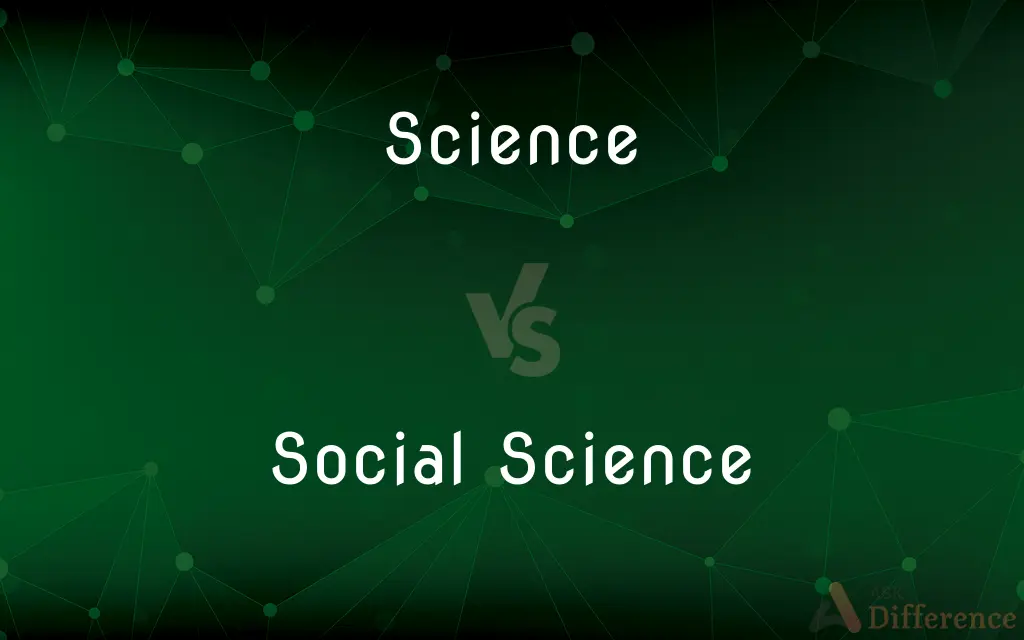Science vs. Social Science — What's the Difference?
By Tayyaba Rehman — Published on November 18, 2023
Science studies natural phenomena and the universe; Social Science examines human behavior and societies.

Difference Between Science and Social Science
Table of Contents
ADVERTISEMENT
Key Differences
Science and Social Science are both systematic studies, but they focus on different subjects. Science delves into understanding the physical universe, exploring everything from microscopic particles to the vastness of space. Social Science, on the other hand, delves into the intricacies of human behavior, cultures, and societies, seeking to understand how they function and evolve.
The methods used in Science and Social Science differ significantly. While Science often relies on controlled experiments, objective measurements, and empirical evidence, Social Science employs surveys, interviews, and observational techniques to gather qualitative and quantitative data about human societies.
The knowledge obtained from Science can lead to technological advancements, new theories about the universe, and solutions to tangible problems. In contrast, insights from Social Science can inform public policies, foster intercultural understanding, and give rise to theories about societal structures and functions.
Though both Science and Social Science aim to expand knowledge, the contexts in which they apply that knowledge diverge. Science often focuses on universal laws and principles, applicable irrespective of human context. Social Science, however, understands that human societies are diverse, and what holds true in one context may not in another.
While Science seeks truths about the natural world, often presenting its findings as universally applicable facts or theories, Social Science recognizes the influence of culture, history, and individual experiences, presenting its findings with an understanding of these complexities.
ADVERTISEMENT
Comparison Chart
Subject Focus
Natural phenomena and the universe.
Human behavior, cultures, and societies.
Methods
Controlled experiments, empirical evidence.
Surveys, interviews, observational techniques.
Outcomes
Technological advancements, universal theories.
Public policies, theories about societal structures.
Context Application
Universal laws and principles.
Context-specific due to cultural diversity.
Presentation of Findings
Often as universally applicable facts/theories.
Recognizing the influence of culture and experiences.
Compare with Definitions
Science
A body of empirical, theoretical, and practical knowledge.
Through Science, we've developed groundbreaking technologies.
Social Science
Research into human interactions and structures.
Social Science helps us examine the effects of social policies.
Science
Systematic study of the physical universe.
Science has expanded our understanding of the cosmos.
Social Science
Investigation into human experiences and societal evolution.
Social Science provides context to historical events.
Science
Methodical investigation based on observation and experiments.
Science often requires a hypothesis to be tested.
Social Science
Discipline analyzing cultural, economic, and political aspects of societies.
Social Science research can shape policy decisions.
Science
Discipline that seeks universal laws and principles.
The laws of physics are fundamental to Science.
Social Science
Study of human societies and relationships.
Social Science offers insights into cultural dynamics.
Science
The observation, identification, description, experimental investigation, and theoretical explanation of phenomena
New advances in science and technology.
Social Science
Exploration of individual and collective behavior.
Through Social Science, we understand group dynamics.
Science
Such activities restricted to a class of natural phenomena
The science of astronomy.
Science
A systematic method or body of knowledge in a given area
The science of marketing.
Science
(Archaic) Knowledge, especially that gained through experience.
Science
(countable) A particular discipline or branch of learning, especially one dealing with measurable or systematic principles rather than intuition or natural ability.
Of course in my opinion Social Studies is more of a science than an art.
Science
Specifically the natural sciences.
My favorite subjects at school are science, mathematics, and history.
Science
Knowledge gained through study or practice; mastery of a particular discipline or area.
Science
The fact of knowing something; knowledge or understanding of a truth.
Science
(uncountable) The collective discipline of study or learning acquired through the scientific method; the sum of knowledge gained from such methods and discipline.
Science
(uncountable) Knowledge derived from scientific disciplines, scientific method, or any systematic effort.
Science
The scientific community.
Science
Synonym of sweet science
Science
Obsolete spelling of scion
Science
To cause to become versed in science; to make skilled; to instruct.
Science
To use science to solve a problem.
Science
Knowledge; knowledge of principles and causes; ascertained truth of facts.
If we conceive God's sight or science, before the creation, to be extended to all and every part of the world, seeing everything as it is, . . . his science or sight from all eternity lays no necessity on anything to come to pass.
Shakespeare's deep and accurate science in mental philosophy.
Science
Accumulated and established knowledge, which has been systematized and formulated with reference to the discovery of general truths or the operation of general laws; knowledge classified and made available in work, life, or the search for truth; comprehensive, profound, or philosophical knowledge.
All this new science that men lere [teach].
Science is . . . a complement of cognitions, having, in point of form, the character of logical perfection, and in point of matter, the character of real truth.
Science
Especially, such knowledge when it relates to the physical world and its phenomena, the nature, constitution, and forces of matter, the qualities and functions of living tissues, etc.; - called also natural science, and physical science.
Voltaire hardly left a single corner of the field entirely unexplored in science, poetry, history, philosophy.
Science
Any branch or department of systematized knowledge considered as a distinct field of investigation or object of study; as, the science of astronomy, of chemistry, or of mind.
Good sense, which only is the gift of Heaven,And though no science, fairly worth the seven.
Science
Art, skill, or expertness, regarded as the result of knowledge of laws and principles.
His science, coolness, and great strength.
Science
To cause to become versed in science; to make skilled; to instruct.
Science
A particular branch of scientific knowledge;
The science of genetics
Science
Ability to produce solutions in some problem domain;
The skill of a well-trained boxer
The sweet science of pugilism
Science
Pursuit of knowledge about natural phenomena.
The beauty of Science lies in its endless curiosity.
Common Curiosities
What is the primary focus of Science?
Science primarily focuses on studying natural phenomena and the physical universe.
What kind of outcomes can one expect from Science research?
Science research can lead to technological advancements and universal theories about the natural world.
How does Social Science differ in its focus from Science?
Social Science concentrates on understanding human behavior, cultures, and societies.
How does Social Science apply its findings?
Social Science insights often inform public policies and understanding of societal structures.
How do cultural aspects influence Social Science?
Cultural dynamics play a significant role in shaping human behavior, which is central to Social Science research.
Can Science and Social Science overlap in their studies?
Yes, interdisciplinary fields like environmental science combine elements of both.
How does Social Science contribute to society?
Social Science informs policies, fosters intercultural understanding, and examines societal functions.
Which is more experimental, Science or Social Science?
Science typically emphasizes controlled experiments, while Social Science might be more observational.
Are the methods in Science and Social Science the same?
No, while Science often uses controlled experiments, Social Science employs techniques like surveys and interviews.
Are findings in Science universally applicable?
Science often seeks universal laws and principles, presenting its findings as such.
Are theories in Science absolute?
No, while Science seeks truths, theories can evolve based on new discoveries.
How does context influence Social Science research?
Social Science recognizes cultural, historical, and individual diversity, making its findings context-specific.
Why is empirical evidence crucial in Science?
Empirical evidence in Science provides objective and verifiable data, ensuring the reliability of findings.
Can one be a researcher in both Science and Social Science?
While rare, interdisciplinary researchers might combine elements of both, depending on the topic.
How do both Science and Social Science contribute to human progress?
While Science advances technological and empirical understanding, Social Science enhances comprehension of human dynamics and societies.
Share Your Discovery

Previous Comparison
Interpersonal Communication vs. Intrapersonal Communication
Next Comparison
Lipstick vs. Lip BalmAuthor Spotlight
Written by
Tayyaba RehmanTayyaba Rehman is a distinguished writer, currently serving as a primary contributor to askdifference.com. As a researcher in semantics and etymology, Tayyaba's passion for the complexity of languages and their distinctions has found a perfect home on the platform. Tayyaba delves into the intricacies of language, distinguishing between commonly confused words and phrases, thereby providing clarity for readers worldwide.












































